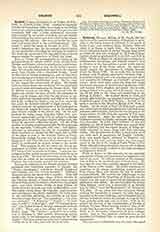

Gomes De Amorim, FRANCISCO, Portuguese poet, dramatist, and novelist; b. at Avelomar, near Oporto, August 13, 1827; d. November 4, 1891. His parents were respectable but so poor that Francisco had to leave school at the age of ten, when he went to Brazil and obtained a situation in a business house at Para. After some time he found an opportunity to study the manners and dialects of the Indian tribes of the Amazon forests. He returned to Portugal in his twentieth year, and two years later, under the influence of the revolutionary ideas of 1848, he composed the poems, “A liberdade”, “A queda da Hungria” and “Garibaldi”. Sympathizing as he did with the principles of romanticism, he, like so many other young writers, fell under the spell of Almeida Garrett, and, to help him to carry out his plan of establishing a national drama, he began to write plays. The first, “Ghigi” (1852), was performed at Lisbon with signal success. It was followed by a long series of dramas, among which the best known are, “Odio de raga”, “Aleijoes sociaes”, “Figados de tigre”, “A prohibicao”, “A viuva”, “A abnegacao”, and “Os herdeiros do millionario”. For several years prior to 1851, in order to make a living, he worked in a hatter’s establishment, but in that year he was appointed to a government post, and found leisure to compose his dramas, poems, and romances. In 1859 he was made librarian to the Minister of Marine.
His lyric fame was firmly fixed by the appearance in 1858 of two collections of poems, the “Cantos matutinos” and the “Ephemeros”. As a novelist, he made himself favorably known by “Os selvagens” (1875) and its sequel, “O remorso vivo” (1876), by the “Amor da patria” (1879), which is partly an historical novel and partly a romance of the sea, by the “Muita parra e pouca uva” (1879) and by many others. In some of the novels, as in several of the plays, he draws upon his knowledge of Brazilian life. His admiration for his friend, Almeida Garrett, who had constantly encouraged him in his literary endeavors, led him to compose his great work, “Garrett, Memorias biographical” (Lisbon, 1881), which not only deals with the public and private life of the greatest modern poet and orator of the country, but is also a history of Portugal from 1799 till 1854.
J. D. M. FORD

